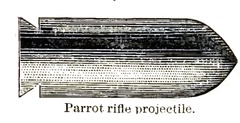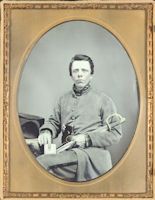June 13—Marched to Berryville, a Yankee post. Heard firing before we got there. We took the left flank a half mile this side of town, and marched to the Winchester Turnpike. We then formed in line of battle with sharpshooters in front. We gave the Rebel yell and charged. But when we got to their breastworks the birds had flown. They did not take their nests with them. Their camp, with all their cooking utensils, quartermaster and commissary stores, were all left in our hands. They were evidently cooking a meal, for plenty of pots full of eatables were still on the fire when we got into their camp. We ate up all we could, and filled our haversacks and pushed on four miles further, and halted for the night. It is raining very hard, and there is, of course, no shelter for us.
Thursday, June 13, 2013
June 13th. A fire was seen early this morning down by the lower fleet, also at the same time, heavy bombardment of Port Hudson going on, by our army and naval forces. Between the hours of four and eight A. M., heavy firing of musketry, artillery, &c., at Port Hudson; at nine A. M. inspected crew at quarters; at five P. M. the Albatross came down the river and anchored ahead of us. Mortars of lower fleet still firing, and the rebels replying with their lower batteries; at ten o’clock P. M., our mortar schooners still at work in their attempt to reduce Port Hudson. Clear and pleasant weather the whole of the twenty-four hours.
Saturday, 13th—Company go on picket.
JUNE 13TH.—The siege continues with increased fury, and the boom of cannon announces the sacrifice of more lives. Instead of any cessation the artillery plays upon the city almost every moment throughout the day.
The variety of the projectiles becomes greater. The shrapnel, I think, must be most formidable to the enemy. It is a shell filled with eighty small balls, which, when the shell is exploded, scatter in every direction. It makes a fearful buzzing sound as it flies—a warning to seek cover, if such can be found. Besides  this there are the parrot, cannister, grape and solid shot. The cannister and grape are also cases wherein are enclosed a number of small balls. But the least fragment from an exploded shell is sufficient to wound or kill.
this there are the parrot, cannister, grape and solid shot. The cannister and grape are also cases wherein are enclosed a number of small balls. But the least fragment from an exploded shell is sufficient to wound or kill.
I have a great curiosity to see the court house at Vicksburg. It stands on a hill, and seems to be the target for many cannon. There is a Confederate flag waving from it defiantly. A proud day  it will be when we haul it down and raise in its stead the stars and stripes, never to be displaced again. The buildings in the city must, by this time, be pretty well riddled with shot and shell. The women, it seems, did not all leave the city before the bombardment began, and I suppose they have determined to brave it out. Their sacrifices and privations are worthy of a better cause, and were they but on our side how we would worship them. It is rumored in camp that Grant is getting reinforcements from the eastern army. I have a great desire to see them, for while we have always thought them to be no less brave, they are said to be better clothed and equipped than the western boys. In fact, from the eastern army, during the last year, the standing report among western boys has been merely such catch phrases as “Bull Run,” “Burnside Crossing the Rappahannock,” “All Quiet on the Potomac.” Perhaps such reports or their substance will continue to fill the headlines of news from those departments until Lincoln commissions Grant commander of the whole army. Should that occur, one grand move forward will be made and the Southern confederacy will be crushed forever.
it will be when we haul it down and raise in its stead the stars and stripes, never to be displaced again. The buildings in the city must, by this time, be pretty well riddled with shot and shell. The women, it seems, did not all leave the city before the bombardment began, and I suppose they have determined to brave it out. Their sacrifices and privations are worthy of a better cause, and were they but on our side how we would worship them. It is rumored in camp that Grant is getting reinforcements from the eastern army. I have a great desire to see them, for while we have always thought them to be no less brave, they are said to be better clothed and equipped than the western boys. In fact, from the eastern army, during the last year, the standing report among western boys has been merely such catch phrases as “Bull Run,” “Burnside Crossing the Rappahannock,” “All Quiet on the Potomac.” Perhaps such reports or their substance will continue to fill the headlines of news from those departments until Lincoln commissions Grant commander of the whole army. Should that occur, one grand move forward will be made and the Southern confederacy will be crushed forever.
We are doing all we can to expedite the glorious victory awaiting us here, yet there are grumblers in the North who are complaining of our slow progress, and treasonable articles are published in some papers that come to us from the North, intended to discourage the soldiers. Why don’t Grant move? If we had all those grumblers in Vicksburg, I fancy they would soon find something from Grant was moving quite briskly. But Grant does not idle away his time himself, nor let his men be idle. If the people of the North will but back us up with their aid and confidence, we shall feel well repaid for all the sufferings we endure here, staring death in the face, and standing like a solid wall between their homes and danger.
Let not a murmur meet the ear,
Nor discontent have sway;
Let not a sullen brow appear
Through all the camp to-day.
June 13 — Firing at intervals was kept up all last night. The sharp shooters as usual commenced their daily operations very early and in a little warmer manner than usual.
June 13th, 1863.—Shell burst just over the roof this morning. Pieces tore through both floors down into the dining-room. The entire ceiling of that room fell in a mass. We had just left it. Every piece of crockery on the table was smashed. The “Daily Citizen” to-day is a foot and a half long and six inches wide. It has a long letter from a Federal officer, P. P. Hill, who was on the gun-boat Cincinnati, that was sunk May 27th. Says it was found in his floating trunk. The editorial says, “The utmost confidence is felt that we can maintain our position until succor comes from outside. The undaunted Johnston is at hand.”
![]()
______
Note: To protect Mrs. Miller’s job as a teacher in New Orleans, the diary was published anonymously, edited by G. W. Cable, names were changed and initials were often used instead of full names — and even the initials differed from the real person’s initials.June 13.—The battle of Winchester, Va., between the National forces under General R. H. Milroy, and the rebel General Ewell, ended this day.—(Doc. 11.)
—Captain Hare, of the Mounted Provost-Guard, attacked Hine’s guerrillas at Wilson’s Creek, near Boston, Ky., killing four and capturing five prisoners and twenty-five horses, and a lot of rifles and equipments. The rebels fled. There was no loss on the National side.—The army of the Potomac commenced its march for the relief of Maryland and Pennsylvania, these States being threatened by a large body of rebels under General Lee.—The negroes of Pennsylvania were called upon by Governor Curtin to furnish troops for the defence of the Government—A Party of rebel cavalry intercepted the cars at Elizabethtown, Ky., capturing sixty horses and committing other depredations.—The town of Eunice, —, was destroyed by the National gunboat Marmora.—The bark Good Hope, in lat 22° 49′ south, long. 42° 09′ west, was captured and burned by the rebel privateer Georgia.—The schooner Fashion, from Mobile, was captured “off the island of Cuba,” by the United States steamer Juniata.—A public meeting was held in Montgomery County, Indiana, at which a resolution was passed, declaring that no enrolment of militia in that county should take place, and a committee was appointed, who waited on the Commissioner and read the resolution, and notified him that an attempt to enroll would be at his peril.—Berryville, Va., was evacuated by the Union troops under Colonel Andrew T. McReynolds, it having been ascertained that Rodes’s division of General Ewell’s corps of rebels was advancing upon that place.
by John Beauchamp Jones
JUNE 13TH—Col. Baylor, of Arizona, has been heard from again. He confesses that he issued the order to slaughter the Apaches in cold blood, and says it is the only mode of dealing with such savages. The President indorses on it that it is “a confession of an infamous crime.”
Yesterday the enemy appeared on the Peninsula, in what numbers we know not yet; but just when Gen. Wise was about to attack, with every prospect of success, an order was received from Gen. Arnold Elzey to fall back toward the city, pickets and all.
A letter from Gen. Holmes, containing an account from one of his scouts, shows that the enemy’s militia in Arkansas and Missouri are putting to death all the men, young or old, having favored the Confederate cause, who fall into their hands. These acts are perpetrated by order of Gen. Prentiss. The President suggests that they be published, both at home and abroad.
Mr. L. Heyliger, our agent at Nassau, sends an account of the firing into and disabling the British steamer Margaret and Jessee by the United States steamer Rhode Island, within a half mile of shore. Several British subjects were wounded. This may make trouble.
Mr. J. S. Lemmon applied by letter to-day for permission to leave a Confederate port for Europe. Major-Gen. Arnold Elzey indorsed on it: “This young man, being a native of Maryland, is not liable to military service in the Confederate States.” Well, Arnold Elzey is also a native of Maryland.









